VIDEO: Chickenpox- Disease and Vaccine, New Zealand
(The Immunisation Advisory Centre, NZ)

Low or no data? Visit zero.govt.nz, scroll down the page then click on our logo to return to our site and browse for free.
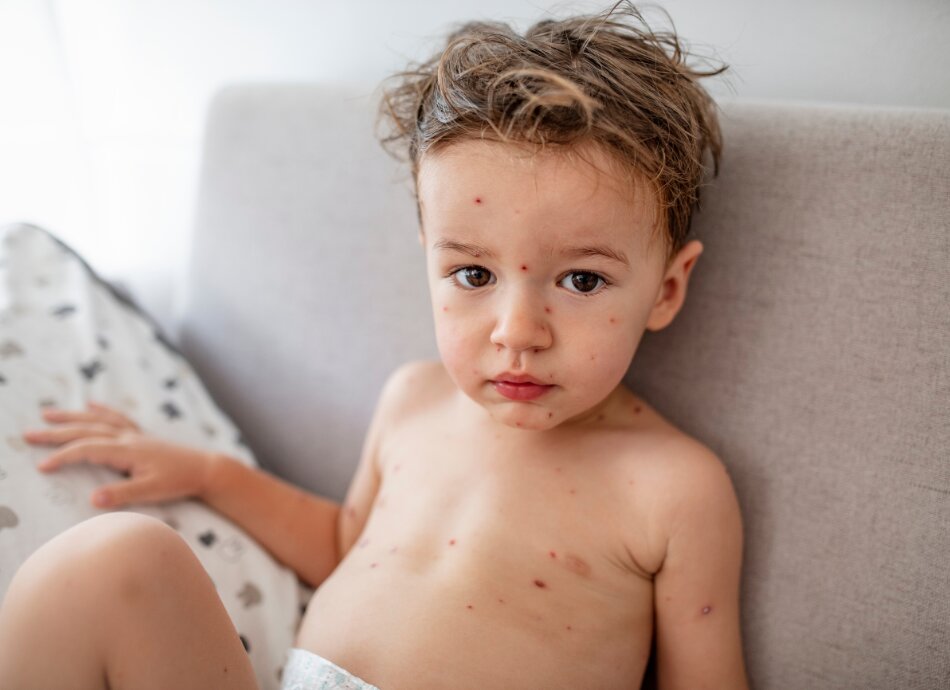
(The Immunisation Advisory Centre, NZ)
Chickenpox is caused by varicella-zoster virus, a type of herpes virus. It is the same virus that can cause shingles later in life.
This chickenpox virus is very contagious, which means it is very easy to catch. It's spread by sneezing and coughing, or by contact with weeping blisters from chickenpox sores. You can catch chickenpox from touching clothing or objects that have fluid from blisters on them.
Generally, the time from catching the infection to seeing the rash (incubation period) for chickenpox is usually 14 to 16 days but it can range from 10 to 21 days. A few days before the first spots appear, you or your child may have a fever, with a sore throat and headache.
You are infectious 2 days before the rash appears until all the blisters have dried up — when the spots are all scabbed over and dry. This usually takes 5 to 7 days.
You are at risk of getting chickenpox if you are exposed to the chickenpox virus and have never had chickenpox or haven’t had the chickenpox vaccine. In New Zealand, about 90% of people who are not vaccinated get chickenpox when they are children. If one child in your family gets chickenpox, it is very likely that other children (or anyone in your household who hasn’t had it before) will get it also.
It takes 2 to 3 weeks for symptoms to appear after infection with the virus. At first, a person with chickenpox may have a sore throat, headache and a fever.
A few days later, a red rash will appear:
Some people have mild chickenpox with under 50 spots; others have hundreds of spots and are very miserable.
| Chickenpox is most infectious from 2 days before the rash is present until after scabs have formed on all the sores and no new sores develop. This usually 5–7 days. Children with chickenpox need to stay home from school and early childhood centres during this time. |
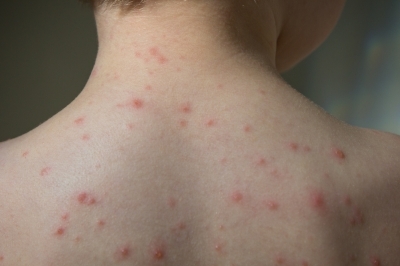
Image: Tuomas Lehtinen - FreeDigitalPhotos.net
In most children, chickenpox is a mild disease that doesn't cause any lasting problems. Sometimes scarring can occur where the spots have been. Around 1 in 20 healthy children develop a bacterial skin infection from chickenpox, usually from scratching the spots. This may need to be treated with antibiotic medicine. Untreated bacterial skin infections can sometimes lead to more serious infections in your lungs or bloodstream infection (septicaemia).
Other complications of chickenpox are rare and include encephalitis (brain inflammation) and inflammation of your joints and kidneys.
Chickenpox tends to be more severe in adolescents and adults, with pneumonia (lung infection) the most common complication. It is also more severe in pregnant women and their unborn babies and people of any age with weakened immune systems.
| Contact your doctor if the person with chickenpox develops any worrying symptoms, such as: |
If you are concerned call Healthline on freephone 0800 611 116 for advice or contact your doctor. |
There are risks for the mother and unborn baby if chickenpox occurs during pregnancy. The highest risk is in the first 20 weeks of pregnancy. Infants exposed to chickenpox before birth are at risk of congenital varicella syndrome and may have skin scarring, eye, limb and brain problems and developmental delay. Maternal chickenpox around the time of delivery can infect your newborn baby. Newborn babies who get chickenpox may have severe disease that can result in death. If you’re pregnant and think you have been exposed to chickenpox, call your GP or lead maternity carer as soon as possible.
Pregnant women should not be given the chickenpox vaccine because its safety in the unborn baby has not yet been proven. However, no harmful effects have been reported when pregnant women have been vaccinated before they knew they were pregnant.
When you are vaccinated, you should avoid getting pregnant for at least 1 month afterwards. If you are planning a pregnancy, ask your midwife or doctor whether you need to be vaccinated against chickenpox first.
For some people, the rash may not be too bad, but for others, it can be extremely itchy and uncomfortable. Treatment is to lessen the symptoms and support your body's immune system to do the rest.
Chickenpox can be very itchy so do try to distract your children from scratching as best you can. Scratching can cause infection and scarring.
If you get chickenpox, you can take care of yourself by following these steps as well.
You should avoid the following medications
Chickenpox is spread through the air, when an infected person coughs or sneezes, or through contact with the fluid in the blisters. Chickenpox is infectious 2 days before the rash appears until all the blisters have dried up. This usually takes 5 to 7 days.
Do not send your child to school or preschool until all the blisters have dried up. This usually takes 5 to 7 days. Wash your hands often and after tending to your child and keep coughs and sneezes covered.
For children who have not really been very sick with chickenpox, staying at home can be difficult. But for some children and adults, chickenpox can be a very serious illness, so it's best to do all you can to stop it spreading. If you get chickenpox as an adult, it’s also important that you stay at home during the infectious period.
Vaccination against chickenpox is free for children at 15 months of age or children turning 11 years of age who have never been infected with or previously vaccinated against chickenpox.
People with a weakened immune system are at high risk of catching the virus, but may not be able to have the vaccination themselves, so it's recommended that close contacts of these people be vaccinated. The vaccine is funded for certain high-risk people and/or their close contacts. Read more about the chickenpox vaccine.
Images of chickenpox.
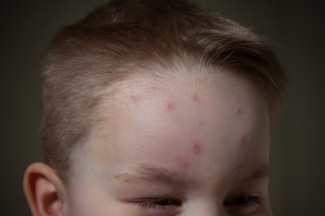 |
 |
|
Chickenpox rash on a boy's forehead Image credit: Tuomas Lehtinen at FreeDigitalPhotos.net |
Chickenpox rash with sores at different stages Image credit: Healthify He Puna Waiora, NZ |
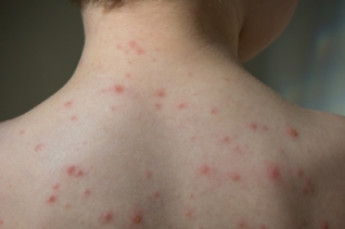 |
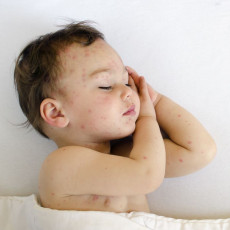 |
|
Chickenpox rash on a boy's back Image credit: Tuomas Lehtinen at FreeDigitalPhotos.net |
Infant with chickenpox. Image credit: 123rf |
The following links provide more information on chickenpox.
Chickenpox(external link) Ministry of Health, NZ
Immunise against chickenpox(external link)(external link) HealthEd, NZ
Chickenpox(external link)(external link) Ministry of Health, NZ
Chickenpox (varicella)(external link)(external link) The Immunisation Advisory Centre, NZ
Immunise against chickenpox Ministry of Health, NZ, 2017 English(external link)(external link), te reo Māori(external link)(external link)
Keeping skin healthy(external link)(external link) Ministry of Health and Workbase, NZ
Infectious diseases(external link)(external link) Health Ed and Ministry of Health, NZ, 2022
From: Auckland Regional HealthPathways(external link)
Pre-conception consultation:
Chickenpox clinical practice guidelines(external link) Royal Children's Hospital Melbourne, Australia
Immunoglobulin administration(external link) Auckland Regional HealthPathway
Chickenpox in pregnancy(external link) Green-top Guideline No. 13, Royal College O&G, UK, 2015
The Immunisation Advisory Centre, University of Auckland, offers a range of courses including:
Visit their education and training centre(external link) for details.
Credits: Healthify editorial team. Healthify is brought to you by Health Navigator Charitable Trust.
Reviewed by: Dr Veronica Playle, Clinical Microbiologist, Auckland. Preview and SEO image: DermNet and Waikato DHB
Last reviewed:
Page last updated: